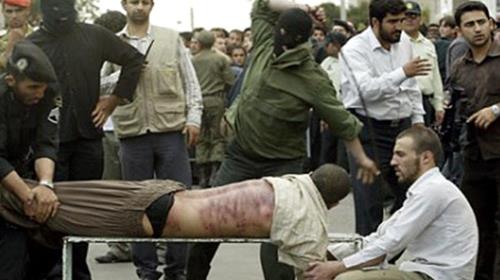
Algemeiner, February 3, 2017 – Despite the many flaws in the nuclear deal with Iran, Tehran’s nuclear program has been curbed. Yet at what cost? As the new Trump administration realizes, the Islamic Republic is still a major violator of the human rights of its people.
The regime’s continued practice of “cruel and inhuman punishments, including floggings, amputations and forced blinding over the past year, exposes the authorities’ utterly brutal sense of justice,” Amnesty International reported, continuing to express concern over executions in Iran, all of which highlight how Iran’s so-called justice system, by legalizing such brutality, has no sense of humanity.
Well into the 21st century, such an aggressive approach vis-à-vis human dignity is quite appalling, to say the least, and deserves serious attention, as Iran continues to neglect, and violate, international prohibitions issued against torture and other abuse.

New York Times Offers ‘Alternative Facts’ On Iran Missile Test
A New York Times editorial headlined “New Tensions With Iran” discusses a recent Iranian missile test and the Trump administration’s…
The regime’s so-called “laws” provide for flogging as punishment for 100 different “offences.” Many flogging victims are protesters under the age of 35, arrested for activities considered protected under internationally recognized rights for freedom of association, belief, expression and religion. Yet Iran is a signatory to the International Covenant on Civil and Political Rights (ICCPR), making it legally bound not to engage in “cruel, inhuman or degrading treatment or punishment.”
Nevertheless, its obligations have been completely ignored by Tehran, with its penalties for crimes regularly including stoning to death — under the ridiculous claim of “protecting religious morals.” Such a horrific practice proves this regime knows nothing of Islam, or of any other religion, for that matter.
Journalists and bloggers in Iran are also subject to flogging for practicing their freedom of speech rights. One member of the press was sentenced to a ruthless 459 lashes for what the regime’s ruling described as “publishing lies” and “creating unease in the public mind” through his work.
Even women have received lashings for attending mixed-gender parties – considered banned under the mullahs’ sick interpretation of Islam – after being caught at such gatherings by Iran’s so-called “morality police.” Indeed, authorities are known to storm parties and beat attendees prior to their being brought to police stations, where they are insulted, interrogated and tortured. Such individuals usually receive 74 lashes and spend three nights behind bars.
While flogging remains a highly practiced method by the mullahs, Amnesty International also reported on a case in which a man’s eyes were forcibly gouged out — in a punishment known as an “eye for an eye” retribution — a horrible fate many imprisoned individuals face.
Other of Iran’s medieval practices include “cross amputations” for thieves, whose fingers and toes are cut off unevenly on either side of their bodies.
It is worth noting here that all of the above atrocities were recorded in 2016, well into the tenure of President Hassan Rouhani , ironically dubbed as a “moderate” and/or “reformist.” Rouhani, in fact, has presided over nearly 3,000 executions, surpassing any recent records set by his predecessors, including firebrand Mahmoud Ahmadinejad .
Ahmed Shaheed, former United Nations special rapporteur on human rights in Iran, voiced his concerns in a report revealing that Iranian authorities in 2015 alone sent to the gallows 966-1,054 people, four of whom were under the age of 18.
Just over a month into the new year, the trend is in full swing.
“The execution of at least 57 prisoners, mostly youths, has been registered in Iran since the beginning of 2017. Twenty of the victims were hanged on January 14,” according to a statement issued by Iranian opposition National Council of Resistance of Iran ( NCRI ), an umbrella group of dissidents, including the People’s Mojahedin Organization of Iran (PMOI/MEK).
NCRI President Maryam Rajavi has long called for a firm stance on Iran’s long slate of human rights violations, most importantly referring Iran’s dossier to the U.N. Security Council.
“The Iranian Resistance declared years ago that it calls for abolition of the death penalty and an end to torture and all forms of rights abuses in Iran,” Rajavi says.
Heshmat Alavi is a political and rights activist. His writing focuses on Iran, ranging from human rights violations, social crackdown, the regime’s support for terrorism and meddling in foreign countries, and the controversial nuclear program.

